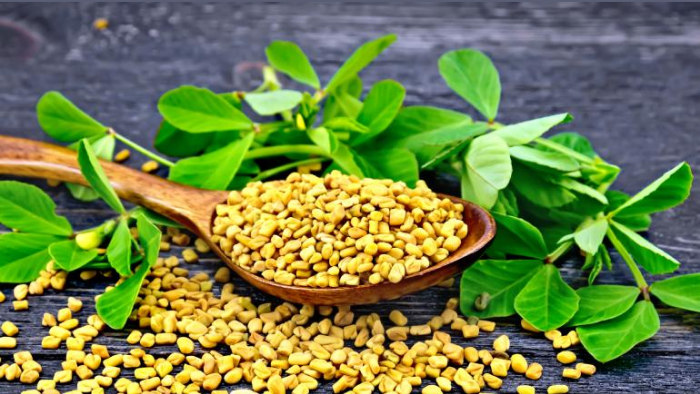Ever bit into bitter-tasting seeds while eating curry? That must have been fenugreek, tiny golden-brown seeds from India used in cooking and medicine. The seeds are hard and stone-like packed with multiple health benefits making it Ayurveda’s power seed.
Fenugreek plant has small green leaves with pods that contain the golden-brown coloured seeds. Both the leaves and seeds are used extensively in cooking. Fenugreek is extensively grown in the north and north-western states of India. This spice dates back to five thousand years back when it was found used in every kitchen in India. From adding flavour to our food to having diverse effects on the body, fenugreek does it all. Today, India is the largest producer of Fenugreek followed by Nepal and the Mediterranean.
Egyptians used fenugreek to induce childbirth. In India, fenugreek is used to promote milk production from the mammary glands. Ancient Romans used it to treat wounds, fever and respiratory issues. During the first Jewish-Roman war, it was mixed with boiling oil to keep intruders from entering the city. Fenugreek is served with food during Rosh Hashanah as it is symbolic of increasing ones’ blessing in the new year. The seeds were also used to make yellow dyes to colour wool.
Fenugreek is an ingredient used in almost every spice blend. The more it is roasted, the more bitter it becomes. It gives a yellow colour to the dish in the absence of turmeric. Fresh or dried leaves can be used in dishes like sauces, gravies, soups and vegetable dishes. The seeds are ground and used in spice blends like garam masala and panch phoran (Indian five-spice).
Some of the notable dishes that use fenugreek as the main ingredient are methi roti, aloo methi gravy, and methi dal. It is used in an Ethiopian dish called Niter Kibbeh, which happens to be clarified butter seasoned with spices like fenugreek, cardamom, cumin and cinnamon. Another use in Ethiopian cuisine involves its use as a spice rub known as Berbere. It contains ground chillies, fenugreek, cardamom, coriander and other spices. Fenugreek seeds are soaked overnight in water and consumed in the morning to help in better digestion and in regulating blood sugar. This is why it is preferred by diabetics.
A storehouse of essential minerals like copper, selenium, manganese, magnesium, calcium and iron, and Vit A, C, K, thiamin, niacin, riboflavin, folic acid and B6, fenugreek is an indispensable herb in every kitchen. It absorbs sugar slowly in the stomach and stimulates the production of insulin. This helps to control blood sugar and reduce insulin resistance. Fenugreek contains a flavonoid known as Naringenin. This helps to lower the levels of those lipids that are present in high cholesterol.
It is also a great boon to those suffering from stomach ailments like constipation, gastritis and indigestion. It also helps to manage menstrual cramps.
As mentioned above, it was helpful in breastfeeding owing to the presence of a component known as Galactagogue. This stimulates the ducts to increase production of milk.
According to Ayurveda, Fenugreek is bitter to taste, light to digest and helps to balance Kapha and Vata Dosha. It promotes the digestive fire (Deepani), keeps the disorders at bay that are caused due to Vata imbalance, like paralysis, constipation, bloating etc. It balances Kapha related disorders such as bronchitis, congestion and cough.
The anti-inflammatory properties of fenugreek help in the treatment of skin disorders. It purifies blood and controls itching. It is also used to treat wounds, abscess, swelling and boils. A paste of the dried leaves or seeds is applied to the affected area.
The presence of saponin in fenugreek helps in good hair health. A paste of sprouted seeds is applied on the hair as a mask to control dandruff, and other hair issues. It also acts as a natural conditioner giving hair a nice lustre.
Fenugreek can be a great companion for a sunday spa. It is one ingredient that is present in every masala dabba without a doubt. Apples don’t keep doctors at bay, our masala dabba does!




